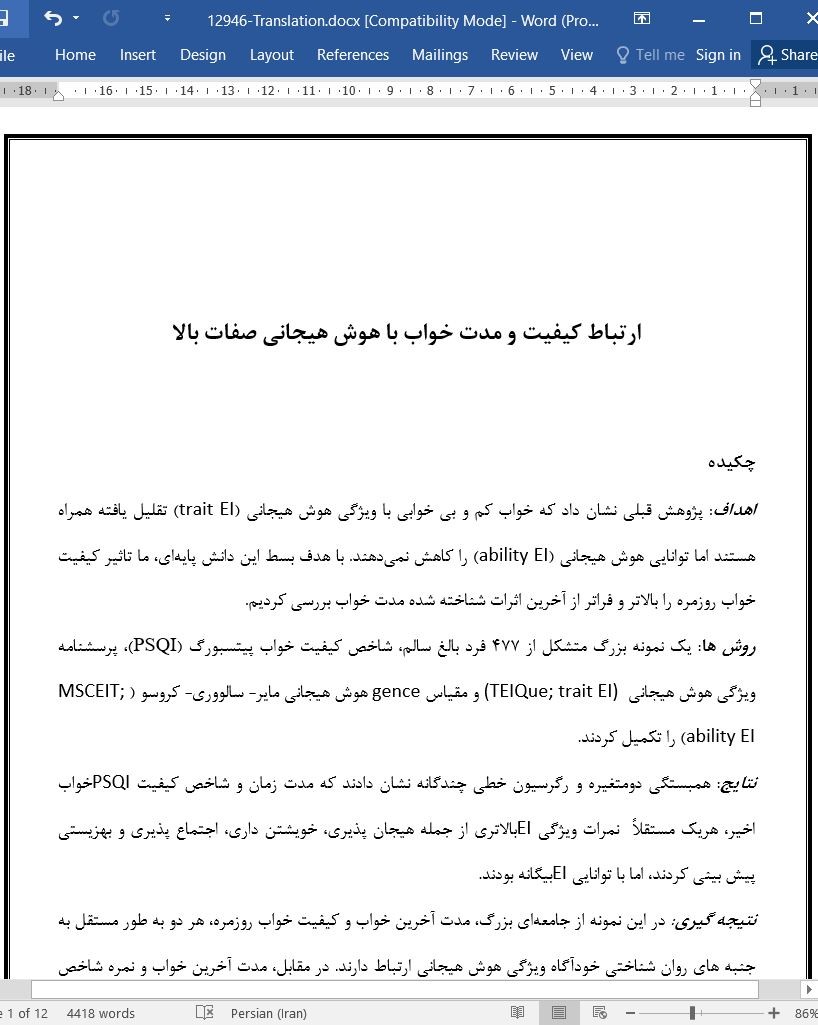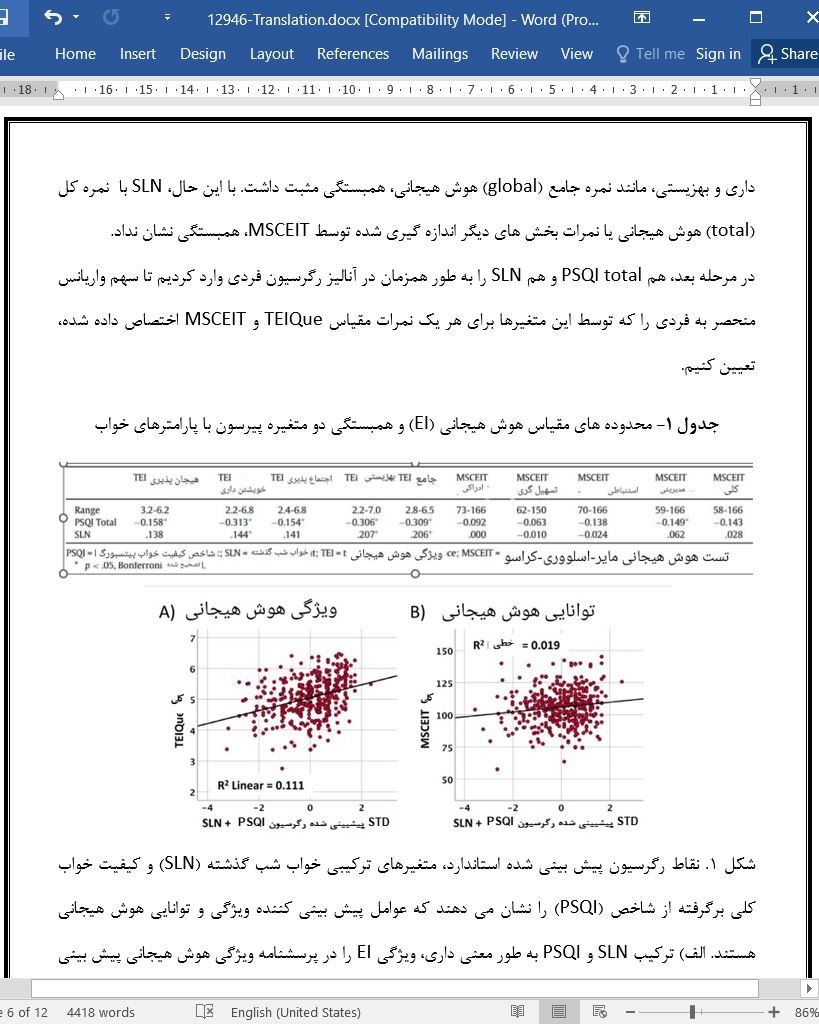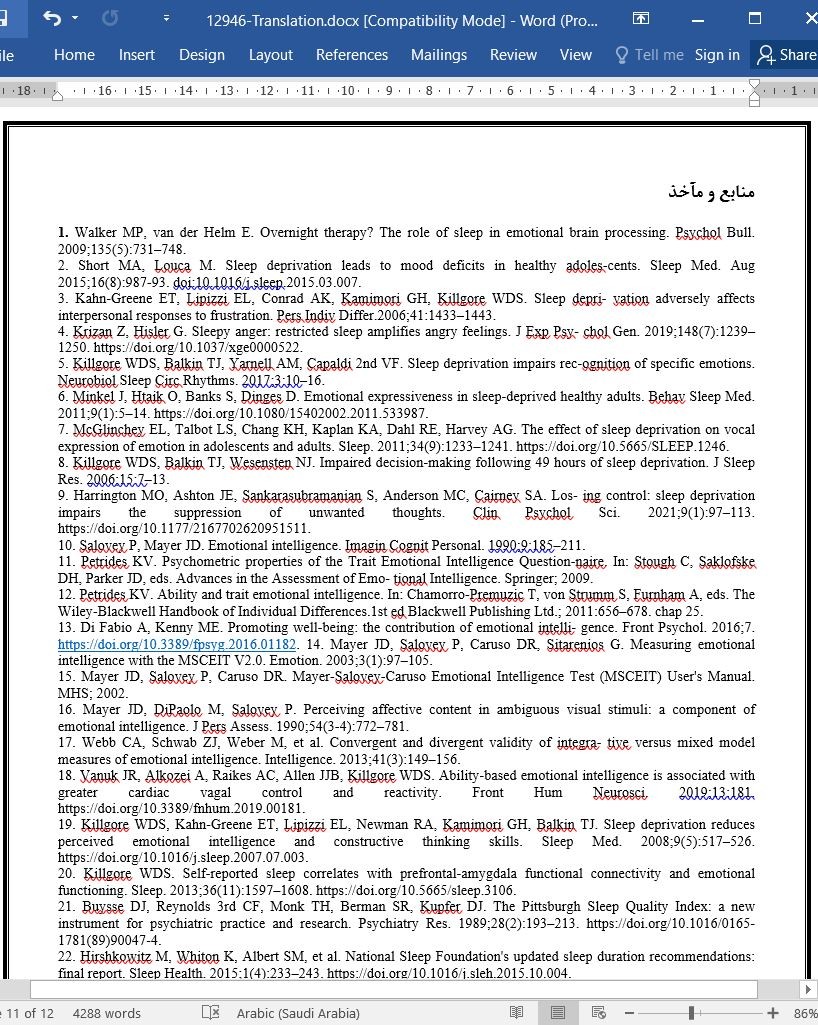
دانلود مقاله ارتباط کیفیت و مدت خواب با هوش هیجانی صفات بالا
چکیده
اهداف: پژوهش قبلی نشان داد که خواب کم و بی خوابی با ویژگی هوش هیجانی (trait EI) تقلیل یافته همراه هستند اما توانایی هوش هیجانی (ability EI) را کاهش نمیدهند. با هدف بسط این دانش پایهای، ما تاثیر کیفیت خواب روزمره را بالاتر و فراتر از آخرین اثرات شناخته شده مدت خواب بررسی کردیم.
روش ها: یک نمونه بزرگ متشکل از ۴۷۷ فرد بالغ سالم، شاخص کیفیت خواب پیتسبورگ (PSQI)، پرسشنامه ویژگی هوش هیجانی (TEIQue; trait EI) و مقیاس genceهوش هیجانی مایر- سالووری- کروسو (MSCEIT; ability EI) را تکمیل کردند.
نتایج: همبستگی دومتغیره و رگرسیون خطی چندگانه نشان دادند که مدت زمان و شاخص کیفیت PSQIخواب اخیر، هریک مستقلاً نمرات ویژگی EIبالاتری از جمله هیجان پذیری، خویشتن داری، اجتماع پذیری و بهزیستی پیش بینی کردند، اما با توانایی EIبیگانه بودند.
نتیجه گیری: در این نمونه از جامعهای بزرگ، مدت آخرین خواب و کیفیت خواب روزمره، هر دو به طور مستقل به جنبه های روان شناختی خودآگاه ویژگی هوش هیجانی ارتباط دارند. در مقابل، مدت آخرین خواب و نمره شاخص PSQI به بیشتر جنبههای متبلور عملکرد هوش هیجانی ارتباط ندارند و در برگیرنده مجموعه کلی اطلاعات عاطفی و توانایی درک و استدلال مفاهیم احساسی هستند. در مجموع، خوداظهاری ها راجع به خواب طولانی تر و با کیفیت تر، با درک ذهنی از عملکرد عاطفی بهتر مرتبط بود، اما با معیارهای عملکرد محور استدلال عاطفی مرتبط نبود.
مقدمه
خواب و احساس جدایی ناپذیرند (1). بدون خواب کافی، انسان ها عبوس (2)، کلافه (3) و مستعد پرخاشگری (4) میشوند. کمبود خواب، بسیاری از ظرفیت های احساسی را از کار می اندازد، که می تواند باعث ایجاد مشکل در تشخیص حالت عاطفی چهره (5)، سخت شدن بیان عواطف از طریق چهره (6) و سرنخ های صوتی (7)، کاستی در استفاده از احساسات برای تصمیم گیری (8) و کاهش توان سرکوب افکار منفی مزاحم شود (9). این قابلیت ها جنبه هایی از ساختار هوش هیجانی را نشان می دهند که هم برای تشخیص و درک دقیق اطلاعات عاطفی و هم برای استدلال کارگشای آن اطلاعات در نظر گرفته می شوند. چنین دانشی برای هدایت افکار و رفتار در خود و دیگران به کار گرفته می شود (10).
بحث
در این مقاله ما نشان دادیم که کیفیت خواب (مطابق شاخص (PSQIطی ماه گذشته در کنار مدت خواب شب قبل از آزمایش، به طرز قابل توجه و مستقلی به مقادیر بالای ویژگی هوش هیجانی ارتباط دارند و به طور کلی با توانایی هوش هیجانی رابطهای ندارند، همانطور که با پارامترهای فعلی به کار رفته تعریف شدند. یافته های فعلی روشن می کنند که افرادی که به طور روزمره کیفیت خواب بالاتر و مدت خواب بیشتر شب قبل از آزمایش دارند، معمولا ویژگی هوش هیجانی بالاتر دارند که بدان معناست خودشان را در موارد ذیل شایسته تر میبینند: 1) تعاملات اجتماعی، گوش دادن و ارتباطات (فاکتور اجتماع پذیری)، 2) درک و بیان موثر احساسات برای حفظ روابط (فاکتور هیجان پذیری)، 3) احساس مثبت، رضایت و شادی داشتن (فاکتور بهزیستی)، 4) کنترل تنش ها و قائق آمدن بر مشکلات زندگی (فاکتور خویشتن داری ). دوباره، باید این را در خاطر داشت که به عنوان یک معیار ویژگی، اینها منعکس کننده ادراک از خود هستند نه توانایی های اندازه گیری شده عینی. مطالعات پیشین ما نشان دادند که دو شب بی خوابی، به شدت ویژگی هوش هیجانی و ظرفیت های سازگاری عاطفی را کاهش می دهد (19) و مدت خواب بیشتر در شب قبل از آزمایش با مقادیر بالای ویژگی هوش هیجانی مرتبط است (20،23). نتایج موجود، آن یافته ها را به یک محتوای غیر آزمایشگاهی بسط و نشان می دهند که کیفیت خواب (ارزیابی شده توسط PSQI ) طی ماه گذشته، بالاتر و فراتر از ارتباط مشاهده شده با مدت آخرین خواب، همچنان مستقلا به ویژگی هوش هیجانی مرتبط است.
Abstract
Objectives Prior work suggests that short sleep and total sleep deprivation are associated with reduced trait Emotional Intelligence (trait EI) but not reduced ability Emotional Intelligence (ability EI). To expand this knowledge base, we investigated the role of habitual sleep quality on trait and ability EI above and beyond the known effects of recent sleep duration.
Methods A large sample, comprising 477 healthy adults completed the Pittsburgh Sleep Quality Index (PSQI), Trait Emotional Intelligence Questionnaire (TEIQue; trait EI), and Mayer-Salovey-Caruso Emotional Intelligence Scale (MSCEIT; ability EI).
Results Bivariate correlation and multiple linear regression showed that recent sleep duration and PSQI sleep quality each independently predicted higher trait EI scores, including Emotionality, Self-Control, Sociability, and Well-being, but were unrelated to ability EI scores.
Conclusions In this large community sample, recent sleep duration and habitual sleep quality both independently associated with self-perceived dispositional aspects of EI (ie, trait EI). In contrast, recent sleep duration and PSQI score were unrelated to more crystalized aspects of EI performance, which encompass the general fund of emotional information and the ability to understand and reason about emotional concepts (ie, ability EI). In sum, self-reported longer sleep duration and better sleep quality were associated with subjective perceptions of better emotional functioning, but was unrelated to performance-based metrics of emotional reasoning.
Introduction
Sleep and emotion are inexorably linked.1 Without sufficient sleep, people become moody,2 easily frustrated,3 and prone to respond with anger.4 Sleep deprivation impairs a host of emotional capacities, which can result in difficulty recognizing emotional facial expressions,5 blunting of emotional expression through facial6 and vocal cues,7 deficits in the ability to use emotions to guide decisionmaking,8 and reduced capacity to suppress unwanted negative thoughts.9 These capabilities represent facets of the construct of Emotional Intelligence (EI), postulated as the ability to both accurately recognize and understand emotional information, reason effectively about that information, and use such knowledge to adaptively guide thought and behavior in oneself and others.10
Discussion
Here, we showed that sleep quality (as assessed by PSQI) over the preceding month, along with the amount of sleep obtained the night before testing, were significantly and independently associated with higher trait EI, but generally unrelated to ability EI, as defined by the current metrics that were employed. The present findings demonstrate that individuals who routinely experience higher quality sleep and obtain more sleep the night before testing also tend to have greater trait EI, suggesting that they perceive themselves as more competent at: 1) social interactions, listening, and communication (Sociability Factor), 2) perceiving and expressing emotions effectively to maintain relationships (Emotionality Factor), 3) feeling positive, fulfilled, and happy (Wellbeing Factor), and 4) controlling impulses and coping with the stresses of life (Self-Control Factor). Again, it should be borne in mind that as a trait measure, these reflect self-perceptions rather than objectively measured abilities. Our prior studies showed that two nights of total sleep deprivation significantly reduced trait EI and emotional coping capacities,19 and that greater sleep time the night before testing was associated with greater trait EI.20,23 The present results expand those findings to a nonlaboratory context and demonstrate that sleep quality (as assessed by the PSQI) over the preceding month is also independently associated to trait EI, above and beyond the association seen with recent sleep quantity.
چکیده
مقدمه
روش ها
شرکت کنندگان
مفاد و فرایند
تجزیه و تحلیل
نتایج
بحث
منابع و مآخذ
Abstract
Introduction
Methods
Participants
Materials and procedure
Analysis
Results
Discussion
Declaration of conflict of interest
References
این محصول شامل پاورپوینت ترجمه نیز می باشد که پس از خرید قابل دانلود می باشد. پاورپوینت این مقاله حاوی 15 اسلاید و 5 فصل است. در صورت نیاز به ارائه مقاله در کنفرانس یا سمینار می توان از این فایل پاورپوینت استفاده کرد.
در این محصول، به همراه ترجمه کامل متن، یک فایل ورد ترجمه خلاصه نیز ارائه شده است. متن فارسی این مقاله در 1300 صفحه (5 کلمه) خلاصه شده و در داخل بسته قرار گرفته است.
علاوه بر ترجمه مقاله، یک فایل ورد نیز به این محصول اضافه شده است که در آن متن به صورت یک پاراگراف انگلیسی و یک پاراگراف فارسی درج شده است که باعث می شود به راحتی قادر به تشخیص ترجمه هر بخش از مقاله و مطالعه آن باشید. این فایل برای یادگیری و مطالعه همزمان متن انگلیسی و فارسی بسیار مفید می باشد.
بخش مهم دیگری از این محصول لغت نامه یا اصطلاحات تخصصی می باشد که در آن تعداد 30 عبارت و اصطلاح تخصصی استفاده شده در این مقاله در یک فایل اکسل جمع آوری شده است. در این فایل اصطلاحات انگلیسی (تک کلمه ای یا چند کلمه ای) در یک ستون و ترجمه آنها در ستون دیگر درج شده است که در صورت نیاز می توان به راحتی از این عبارات استفاده کرد.
- ترجمه فارسی مقاله با فرمت ورد (word) با قابلیت ویرایش و pdf بدون آرم سایت ای ترجمه
- پاورپوینت فارسی با فرمت pptx
- خلاصه فارسی با فرمت ورد (word)
- متن پاراگراف به پاراگراف انگلیسی و فارسی با فرمت ورد (word)
- اصطلاحات تخصصی با فرمت اکسل



